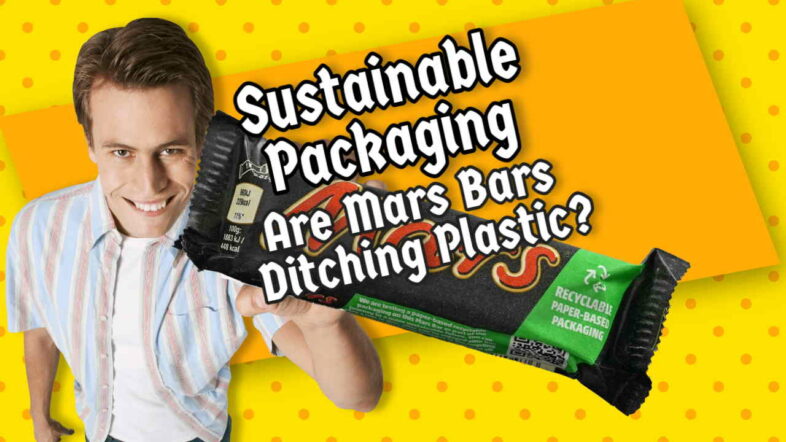In the pursuit of Sustainable Packaging: Mars Bars has announced that it will be trailblazing paper wrappers instead of its current use of plastic. This is significant for such a large and leading company to be taking action to reduce their contribution to plastic pollution and indirectly also enhancing efforts to fight climate change.
The shift towards sustainability is becoming a priority for industries around the world. It’s a move marked by innovation and the willingness to tackle complex challenges head-on. One such challenge is reinventing product packaging to reduce plastic waste. Here, we discuss the journey embarked upon by Mars, the renowned chocolate bar company, as they test paper wrappers for their iconic Mars bars.
Taking the Eco-friendly Leap: Mars’ Large-Scale Trial of Paper Wrappers
In an ambitious stride towards sustainability, the makers of Mars bars have announced an experiment: trialing paper wrappers to replace their traditional plastic ones. This initiative, driven by a desire to lessen the environmental impact of plastic, has been rolled out across Tesco stores in the UK.
This move forms part of Mars’ “Sustainable in a Generation Plan”, a bold commitment to slash the use of plastics by a third in the short term. Ultimately, Mars is striving to ensure all its packaging is recyclable, reusable, or compostable—an ambition mirroring a rapidly growing trend amongst environmentally conscious consumers and businesses alike.
At present the plastic wrapper fails to decay. Once in the environment, they contribute to plastic pollution, eventually breaking up into tiny pieces of “microplastic” and in many ways becoming even worse for wildlife.
The waste industry uses depackaging equipment to separate source-segregated organic waste (mostly kitchen waste), but the equipment struggles to cope with the ubiquitous presence of plastic thrown into the organic waste bins by the unthinking public.
New equipment is emerging to separate plastics out from organic pulp made from food waste. That pulp, if free from plastic, can be valuable for feeding the anaerobic digestion process to make renewable energy plus a natural fertilizer.
Overcoming Obstacles: The Challenges in Packaging
Transitioning to a paper wrapper isn’t a simple process. Richard Sutherland-Moore, a packaging expert at Mars Wrigley UK, highlighted the significant difficulties involved in creating packaging that can endure the demands of production, transportation, and storage. Moreover, it must maintain product freshness, a critical attribute for consumer satisfaction.
The Mars bar presents a unique hurdle given its distinct shape that requires a specialized wrapper. Yet Mars views these challenges not as roadblocks, but as springboards to explore alternative packaging solutions for all its confectionery products.
Riding the Green Wave: The Trend Towards Sustainable Packaging
A growing wave of eco-consciousness is sweeping through industries and consumers alike, with sustainable packaging at the forefront. As one of the principal contributors to the plastic pollution crisis, packaging waste is under intense scrutiny. The pressure is mounting for companies to unearth innovative solutions that align with their environmental responsibilities.
Not only is sustainable packaging a necessity for planetary health, but it also resonates with an increasing demographic of environmentally mindful consumers. Brands that proactively work towards sustainability stand to gain enhanced customer loyalty.

Key Considerations for Sustainable Packaging:
- Durability: The packaging must endure the rigors of production, transportation, and storage.
- Product Preservation: Packaging must maintain product freshness throughout its shelf-life.
- Eco-friendly: All packaging materials should aim to be recyclable, reusable, or compostable.
- Consumer Appeal: Sustainable packaging needs to appeal to the growing demographic of eco-conscious consumers.
A Step towards a Greener Future: Conclusion
The large-scale trial of paper wrappers for Mars bars represents an encouraging advance in the pursuit of more sustainable packaging. Although the path is strewn with challenges, the commitment shown by companies such as Mars to unearth viable solutions is a promising indication of the direction in which the industry is heading.
As Mars continues to explore alternative packaging solutions for all its confectionery products, it makes significant strides towards its Sustainable in a Generation Plan. Such initiatives underscore Mars’ contribution to a more sustainable future—an effort that could inspire other brands to follow suit in the war against plastic pollution.
A Glimpse into the Future: The Potential of Biodegradable Packaging
The trial of paper wrappers for Mars bars is just the beginning of what’s possible in the world of sustainable packaging. With continued research and development, the potential for innovations such as biodegradable and edible packaging could soon become a reality.
The idea of packaging that can break down naturally in the environment, or even be consumed as part of the product, offers an exciting solution to the plastic waste problem. Such a future could potentially eliminate packaging waste altogether, revolutionizing our consumption habits and drastically reducing our environmental impact.
The Power of Consumer Demand: Driving Sustainable Change
Consumer behavior has a significant influence on the direction of industry trends. As more people become aware of the environmental impact of their consumption habits, their demand for more sustainable options will continue to grow. Businesses must adapt to meet these evolving demands, using their influence and resources to drive positive change.
Consumers can contribute to this shift towards sustainability by actively choosing products with sustainable packaging and supporting companies that are making genuine efforts to reduce their environmental impact. As customers, our collective buying power can act as a catalyst for change, encouraging businesses to prioritize sustainability.
The Role of Legislation: Creating a Sustainable Framework
Legislation plays a crucial role in the transition towards more sustainable packaging. Governments around the world are beginning to implement laws that encourage or mandate businesses to reduce their reliance on single-use plastics and invest in more sustainable alternatives.
Such legislation not only encourages businesses to take responsibility for their environmental impact but also creates a level playing field. When all companies are required to meet certain environmental standards, it ensures that those taking action are not disadvantaged and encourages a collective shift towards more sustainable practices.
The Road Ahead: Conclusion
As Mars sets out to meet its ambitious Sustainable in a Generation Plan, the road ahead promises to be challenging yet rewarding. By bravely stepping into the unknown and leading the way toward more sustainable packaging, Mars is setting a precedent for other companies to follow.
While the challenges are significant, the potential benefits — for businesses, consumers, and the planet — are immense. With the combined effort of consumers, businesses, and legislation, we have a real opportunity to tackle the plastic pollution crisis and create a more sustainable future.
In the end, it’s not just about creating a paper wrapper for Mars bars. It’s about rethinking our approach to packaging and consumption in the broadest sense. It’s about fostering an understanding that every action we take, every product we buy, and every decision we make has an impact on the world around us — and it’s within our power to make that impact a positive one.
Incorporating sustainable packaging into their products requires businesses to re-evaluate their existing manufacturing practices. Traditional production lines must be revamped to accommodate new materials that may behave differently than plastic, which may necessitate new machinery, altered processes, or even additional training for staff.
In addition, companies need to consider the source of these new materials. To truly embrace sustainability, the materials should ideally be sourced responsibly, ensuring minimal impact on the environment and fair treatment of workers involved in their production.
Fostering Collaborations: Accelerating Sustainable Innovations
There’s a wealth of knowledge and innovation within the packaging industry, and fostering collaborations between businesses, research institutions, and innovative startups can accelerate the development and adoption of sustainable packaging solutions. By sharing resources, knowledge, and expertise, we can better address the common challenges we face and drive forward more rapidly toward our shared goal of sustainability.
Expanding Scope: Beyond the Mars Bars
While the focus here has been on the Mars Bars’ paper wrapper trials, it’s important to note that Mars is not the only company exploring sustainable packaging solutions. Brands across a wide range of industries are rising to the challenge, recognizing the importance of aligning their operations with the values of their increasingly eco-conscious customer base.
The road to sustainability is not limited to one company or one industry. It requires collective action and a shared commitment to protecting our planet. As more businesses join the journey toward sustainability, they will undoubtedly face their own unique set of challenges and opportunities.
Final Thoughts on Sustainable Packaging: Embracing a Culture of Sustainability
The transition towards sustainable packaging signifies a larger shift towards a culture of sustainability. This cultural shift involves recognizing the interconnectedness of our actions and understanding that the health of our planet is linked to the health of our communities and, ultimately, our own health.
In the journey towards a more sustainable future, every step counts. The trial of paper wrappers for Mars bars is one such step, serving as a reminder that progress is often made one small, practical action at a time. As we continue to innovate, adapt, and evolve, we are learning to create not only with our immediate needs in mind but also considering the future health of our planet and generations to come.
Indeed, the Mars “Sustainable in a Generation Plan” offers more than just an inspiring example of corporate responsibility. It serves as a roadmap for other companies and individuals alike — a demonstration that, with commitment, creativity, and collaboration, we can all play a part in solving the global plastic crisis and fostering a more sustainable world.





